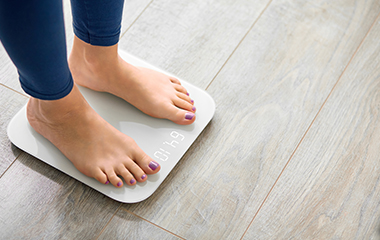Why Sleep Is the Best Medicine? How Sleep & the Immune System Work Together
If you feel heavy-eyed when you’re feeling under the weather, it’s not just you.
Struggles & Remedies


If you feel heavy-eyed when you’re feeling under the weather, it’s not just you. Many people feel sleepy and tired when sick. Not surprisingly, research has shown that sleep and the immune system are connected in a bidirectional relationship. Sleep makes your immune system more effective and immune cells promote sleep.1
You’ve probably heard that sleep is the best medicine when you’re not feeling well. When you feel unwell and fall asleep, your immune system gets to work to fight the infection. Keep reading to learn about how your immune system works, what it does while you sleep, and what happens to it when you don’t get enough sleep.
You’ve probably heard that sleep is the best medicine when you’re not feeling well. When you feel unwell and fall asleep, your immune system gets to work to fight the infection. Keep reading to learn about how your immune system works, what it does while you sleep, and what happens to it when you don’t get enough sleep.
What is the Immune System and How Does it Work?
Your immune system is your body’s defense against infection. It works constantly to keep your body healthy and fight off anything that tries to throw it off balance.
Your immune system is made up of a group of certain types of white blood cells, lymph nodes, spleen, tonsils and adenoids, thymus, bone marrow, skin and mucous membranes, and gastrointestinal tract.2 All of these work together to fight harmful invaders.
Your immune system is categorized into the:
Your immune system is made up of a group of certain types of white blood cells, lymph nodes, spleen, tonsils and adenoids, thymus, bone marrow, skin and mucous membranes, and gastrointestinal tract.2 All of these work together to fight harmful invaders.
Your immune system is categorized into the:
- Innate immune system
- Adaptive immune system
Innate Immune System
Your innate immune system is your body’s first line of defense against foreign invaders. It is not specific to a particular pathogen but quickly recognizes the general properties of invaders.3 It produces a rapid response, usually within minutes or hours after recognizing an invader.4
Physical barriers like your skin and mucous membranes are part of your innate immune system. But when pathogens get past these roadblocks, your innate immune system activates cells such as phagocytes (macrophages and neutrophils), dendritic cells, mast cells, basophils, eosinophils, natural killer (NK) cells, and lymphocytes (T cells).3
Physical barriers like your skin and mucous membranes are part of your innate immune system. But when pathogens get past these roadblocks, your innate immune system activates cells such as phagocytes (macrophages and neutrophils), dendritic cells, mast cells, basophils, eosinophils, natural killer (NK) cells, and lymphocytes (T cells).3
Adaptive Immune System
The next line of defense in your immune system is your adaptive immune system (or acquired immune system). Your adaptive immune system is the part of your immune system that has learned over time to be highly specific to the particular invader present.5
Unlike your innate immune system, your adaptive immune system does not produce an immediate immune response the first time it sees a pathogen. Instead, it memorizes specific antigens (substances on the surface of pathogens) so that it can attack them when they come on the scene again.6
Your adaptive immune system consists of white blood cells called lymphocytes. The lymphocytes involved in your adaptive immune system are B cells and T cells.
B lymphocytes become cells that produce antibodies. Antibodies function by attaching to specific antigens on harmful cells or substances so that other immune cells can target and destroy these antigens.6
T lymphocytes have the important function of attacking antigens directly. They also release chemicals called cytokines that are important for modulating the entire immune response.6 Your adaptive immune system complements your innate immune system. They work hand-in-hand, not separately.3
Unlike your innate immune system, your adaptive immune system does not produce an immediate immune response the first time it sees a pathogen. Instead, it memorizes specific antigens (substances on the surface of pathogens) so that it can attack them when they come on the scene again.6
Your adaptive immune system consists of white blood cells called lymphocytes. The lymphocytes involved in your adaptive immune system are B cells and T cells.
B lymphocytes become cells that produce antibodies. Antibodies function by attaching to specific antigens on harmful cells or substances so that other immune cells can target and destroy these antigens.6
T lymphocytes have the important function of attacking antigens directly. They also release chemicals called cytokines that are important for modulating the entire immune response.6 Your adaptive immune system complements your innate immune system. They work hand-in-hand, not separately.3
What Does Your Immune System Do While You Sleep?
The four stages of sleep are divided into two phases: non-rapid eye movement (Non-REM or NREM), which has three stages, and REM sleep. After you fall asleep, your body begins to cycle through NREM and REM sleep. You start with stage 1 of NREM sleep, then stages 2 and 3, and lastly REM sleep. And the cycle begins again at stage 1.7 NREM sleep makes up most of your sleep time.8
Your immune system is mostly triggered in stage 3 (NREM) sleep, also known as deep sleep.9 During NREM sleep, your bodily processes like metabolism slow down, giving your immune system more energy to fight infection.10 When you don’t get enough sleep, your immune system has to work overtime to keep you healthy.
Scientific evidence shows that when you sleep, your body produces more chemical compounds called cytokines, which regulate the interaction between certain T cells and antigen-presenting cells.11 One of the primary functions of the T cells in your immune system is to produce different kinds of cytokines. Some T cells produce cytokines that stimulate cellular immunity, while other T cells produce cytokines that stimulate the production of antibodies.12
As mentioned earlier, immunity and sleep are interrelated. Researchers have shown that some T cells play a role in NREM sleep by sending chemical signals to the brain to release sleep hormones.13 So your immune system increases the production of cytokines, and cytokines also stimulate the onset of sleep.
Your immune system is mostly triggered in stage 3 (NREM) sleep, also known as deep sleep.9 During NREM sleep, your bodily processes like metabolism slow down, giving your immune system more energy to fight infection.10 When you don’t get enough sleep, your immune system has to work overtime to keep you healthy.
Scientific evidence shows that when you sleep, your body produces more chemical compounds called cytokines, which regulate the interaction between certain T cells and antigen-presenting cells.11 One of the primary functions of the T cells in your immune system is to produce different kinds of cytokines. Some T cells produce cytokines that stimulate cellular immunity, while other T cells produce cytokines that stimulate the production of antibodies.12
As mentioned earlier, immunity and sleep are interrelated. Researchers have shown that some T cells play a role in NREM sleep by sending chemical signals to the brain to release sleep hormones.13 So your immune system increases the production of cytokines, and cytokines also stimulate the onset of sleep.
Here’s what your immune system is doing in the different stages of sleep
Stage 1 NREM sleep:
This is the first stage of sleep. Your eye movement and muscle activity start to slow down. Your immune system hasn’t kicked in yet.7
Stage 2 NREM sleep:
You are still in light sleep. Your eye movement stops, heart rate slows, and body temperature decreases. Your body is preparing to go into deep sleep.7
Stage 3 NREM sleep:
You enter into deep sleep. Your brain produces delta waves, which are very slow brain waves. You have no eye movement or muscle activity, and it’s hard for anyone to wake you up. It’s in this stage of sleep that your immune system gets the most energy.7
What about the circadian system?
The circadian clock comes from cell signals throughout our bodies. Although the central clock exists in the brain, circadian clocks exist throughout the body. They prepare the body to exercise, feed, digest, and sleep at specific times of day.9 Your exposure to light during the day keeps you awake and active, while at nighttime, your body produces melatonin, which prompts you to go to sleep.
The circadian system acts in concert with sleep to increase the production of hormones, like the enhanced growth hormone and prolactin, while decreasing the levels of cortisol.11 All of these hormonal changes support and strengthen your healthy immune system, explaining why sleep is the best medicine. It also shows why when someone is feeling under the weather, sleeping can help them with recovery.
But when the circadian rhythm is thrown off, your sleep cycle can be negatively impacted, leading to sleeping problems like insomnia and excessive daytime sleepiness.9 To maintain a healthy circadian rhythm, experts recommend following sleep hygiene tips like exposure to natural light during the day and having a consistent sleep schedule at night.9 Experts recommend seven to eight hours of sleep for most adults, nine to 10 hours for teenagers, and 10 or more hours for school-aged children.14
The circadian system acts in concert with sleep to increase the production of hormones, like the enhanced growth hormone and prolactin, while decreasing the levels of cortisol.11 All of these hormonal changes support and strengthen your healthy immune system, explaining why sleep is the best medicine. It also shows why when someone is feeling under the weather, sleeping can help them with recovery.
But when the circadian rhythm is thrown off, your sleep cycle can be negatively impacted, leading to sleeping problems like insomnia and excessive daytime sleepiness.9 To maintain a healthy circadian rhythm, experts recommend following sleep hygiene tips like exposure to natural light during the day and having a consistent sleep schedule at night.9 Experts recommend seven to eight hours of sleep for most adults, nine to 10 hours for teenagers, and 10 or more hours for school-aged children.14
What Happens to Your Immune System When You Don’t Get Enough Sleep
Your Immune System Doesn’t Get the Energy It Needs.
Sleep puts your body in a restful and non-stressed state. Your metabolic reactions slow down to allow your immune system to repair any cell damage from your day.15
Scientists believe that the metabolic rate reduces by about 15% during sleep.15 But if you don’t get enough sleep (particularly NREM sleep), your body’s metabolism won’t slow down enough to transfer some energy to your immune system.
Scientists believe that the metabolic rate reduces by about 15% during sleep.15 But if you don’t get enough sleep (particularly NREM sleep), your body’s metabolism won’t slow down enough to transfer some energy to your immune system.
Your Immune System Can’t Keep Up.
One of the primary functions of the T cells in your immune system is to produce different kinds of cytokines, which are important stimulators of immune function. If you’re not getting enough sleep, your T cells won’t make optimal levels of cytokines.
For example, in one study, researchers restricted the time allowed for sleep to just four hours for one night in some participants, which decreased NK cell (a subset of T cells) activity in those participants; interestingly, afte a night of resumed sleep, NK cell activity returned to baseline levels.16 Therefore, even a modest amount of sleep loss can impact healthy immune function.
For example, in one study, researchers restricted the time allowed for sleep to just four hours for one night in some participants, which decreased NK cell (a subset of T cells) activity in those participants; interestingly, afte a night of resumed sleep, NK cell activity returned to baseline levels.16 Therefore, even a modest amount of sleep loss can impact healthy immune function.
Your Immune System is Stuck in “Attack” Mode.
If you struggle to sleep well at night, this increases stress, which can increase your blood pressure. When this happens the physical stress on your blood vessels can cause an inflammatory response. High blood pressure causes overproduction of inflammatory mediators, which disrupt the balance of t cells and can trigger your body to go into attack mode, rather than provide protection.17
When you don’t feel well, your immune system starts to work overtime. You may feel extra tired or like you can’t sleep when sick because your immune system is doing some repair work.
Your immune system can affect your sleep patterns. Cytokines like IL-1 may influence the parts of the brain that regulate sleep-wake behavior.11 In humans, some studies have provided evidence of peak quantities of IL-1, TNF, and IL-6 found during sleep or in the early morning hours.18 Such findings show us that cytokines are involved in the regulation of physiological sleep-wake behavior.18
Some cytokines may help promote sleep.11 The more immersed you are in deep sleep, the more time your immune system has to fight infections. This explains why you may have increased sleepiness when you have an infection. It’s also why you may feel a little refreshed when you eventually wake up from a good mid-day nap or night-time sleep when you’re sick.
Experts have established that sleep and the immune system are connected in a bidirectional relationship — the better your sleep hygiene, the more effective your immune system, and vice versa. Your innate and adaptive immune systems are constantly working together to fight infections and sleeping complements their efforts.11
Sleep is truly the best medicine when you’re sick. When you don’t feel well, it’s best to get sufficient rest. Before you sleep, eliminate all distractions and ensure you are in a calming environment. You don’t want to miss the opportunity for your body to go into deep sleep, the stage of sleep where your immune system gets the most energy.
When you don’t feel well, your immune system starts to work overtime. You may feel extra tired or like you can’t sleep when sick because your immune system is doing some repair work.
Your immune system can affect your sleep patterns. Cytokines like IL-1 may influence the parts of the brain that regulate sleep-wake behavior.11 In humans, some studies have provided evidence of peak quantities of IL-1, TNF, and IL-6 found during sleep or in the early morning hours.18 Such findings show us that cytokines are involved in the regulation of physiological sleep-wake behavior.18
Some cytokines may help promote sleep.11 The more immersed you are in deep sleep, the more time your immune system has to fight infections. This explains why you may have increased sleepiness when you have an infection. It’s also why you may feel a little refreshed when you eventually wake up from a good mid-day nap or night-time sleep when you’re sick.
Experts have established that sleep and the immune system are connected in a bidirectional relationship — the better your sleep hygiene, the more effective your immune system, and vice versa. Your innate and adaptive immune systems are constantly working together to fight infections and sleeping complements their efforts.11
Sleep is truly the best medicine when you’re sick. When you don’t feel well, it’s best to get sufficient rest. Before you sleep, eliminate all distractions and ensure you are in a calming environment. You don’t want to miss the opportunity for your body to go into deep sleep, the stage of sleep where your immune system gets the most energy.
How to Encourage Healthy Sleep Hygiene
Establishing healthy sleep habits is essential to your overall health. Promoting a healthy lifestyle goes hand-in-hand with ensuring that you are not only getting enough sleep, but also getting quality sleep.
ZzzQuil is here to help you on your journey to your best sleep. Sign up for ZzzQuil’s better Sleep in 1-2-Zzz to learn more about how you can optimize your sleep routine.
ZzzQuil is here to help you on your journey to your best sleep. Sign up for ZzzQuil’s better Sleep in 1-2-Zzz to learn more about how you can optimize your sleep routine.
References:
- Irwin MR. Sleep and inflammation: partners in sickness and in health. Nat Rev Immunol. 2019;19(11):702-715. doi:10.1038/s41577-019-0190-z
- Immune System: Parts & Common Problems. Cleveland Clinic. Accessed January 29, 2022.
- Alberts B, Johnson A, Lewis J, Raff M, Roberts K, Walter P. Innate immunity. In: Molecular Biology of the Cell. 4th Edition. Garland Science; 2002.
- Warrington R, Watson W, Kim HL, Antonetti FR. An introduction to immunology and immunopathology. Allergy Asthma Clin Immunol. 2011;7(S1):S1. doi:10.1186/1710-1492-7-S1-S1
- Raff M, Alberts B, Lewis J, Johnson A. The Adaptive Immune System. In: Garland Science; 2002.
- Immune response: MedlinePlus Medical Encyclopedia. Accessed January 26, 2022.
- Sleep Basics: REM & NREM, Sleep Stages, Good Sleep Habits & More. Cleveland Clinic. Accessed January 30, 2022.
- Lorton D, Lubahn CL, Estus C, et al. Bidirectional Communication between the Brain and the Immune System: Implications for Physiological Sleep and Disorders with Disrupted Sleep. Neuroimmunomodulation. 2006;13(5-6):357-374. doi:10.1159/000104864
- What Is Circadian Rhythm? Sleep Foundation. Published September 25, 2020. Accessed January 29, 2022.
- Sleep & Immunity: Can a Lack of Sleep Make You Sick? Sleep Foundation. Published October 26, 2018. Accessed January 30, 2022.
- Besedovsky L, Lange T, Born J. Sleep and immune function. Pflugers Arch. 2012;463(1):121-137. doi:10.1007/s00424-011-1044-0
- Ganz FD. Sleep and Immune Function. Crit Care Nurse. 2012;32(2):e19-e25. doi:10.4037/ccn2012689
- Kapsimalis F, Richardson G, Opp MR, Kryger M. Cytokines and normal sleep. Curr Opin Pulm Med. 2005;11(6):481-484. doi:10.1097/01.mcp.0000183062.98665.6b
- Hirshkowitz M, Whiton K, Albert SM, et al. National Sleep Foundation’s sleep time duration recommendations: methodology and results summary. Sleep health. 2015;1(1):40-43. doi:10.1016/J.SLEH.2014.12.010
- Sharma S, Kavuru M. Sleep and Metabolism: An Overview. Int J Endocrinol. 2010;2010:270832. doi:10.1155/2010/270832
- Irwin MR, Mascovich A, Gillin JC, Willoughby R, Pike J, Smith TL [1994]. Partial sleep deprivation reduces natural killer cell activity in humans. Psychosom Med 56(6):493-498.
- Mullington JM, Simpson NS, Meier-Ewert HK, Haack M. Sleep Loss and Inflammation. Best Pract Res Clin Endocrinol Metab. 2010;24(5):775-784. doi:10.1016/j.beem.2010.08.014
- Besedovsky L, Lange T, Haack M. The Sleep-Immune Crosstalk in Health and Disease. Physiol Rev. 2019;99(3):1325-1380. doi:10.1152/physrev.00010.2018




